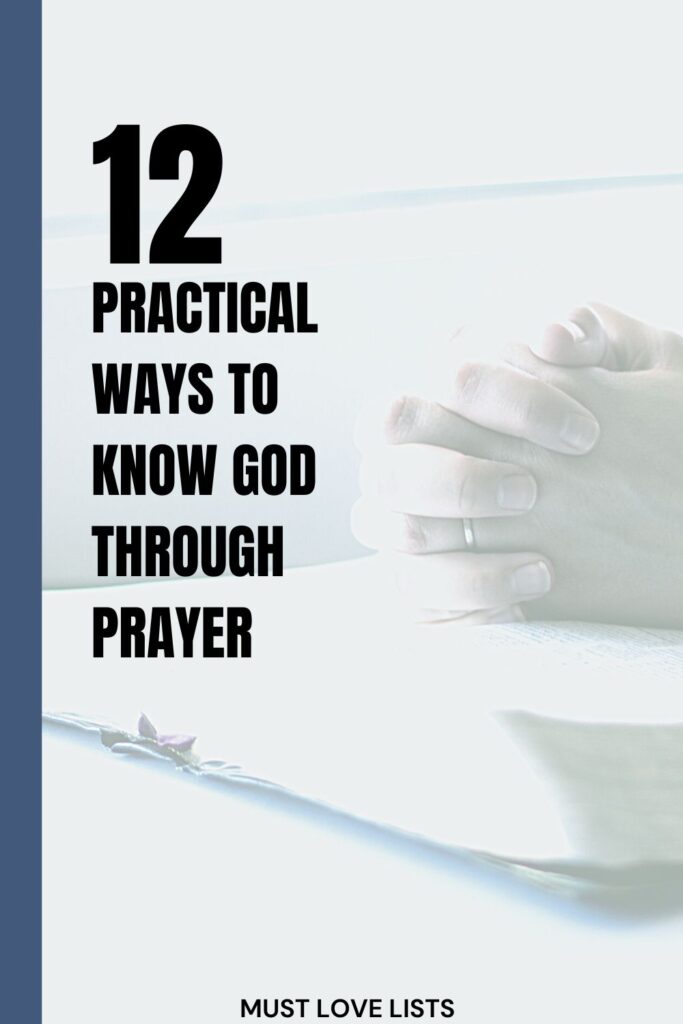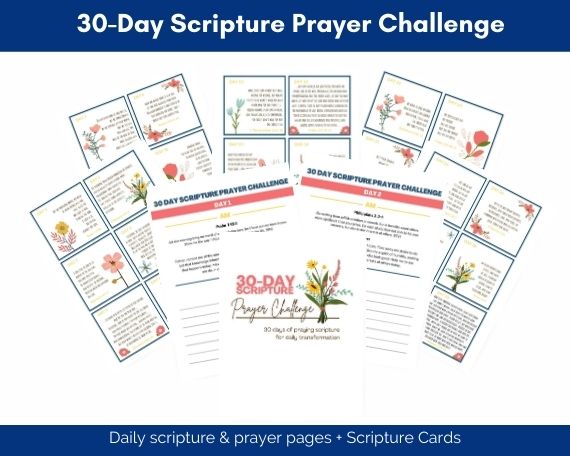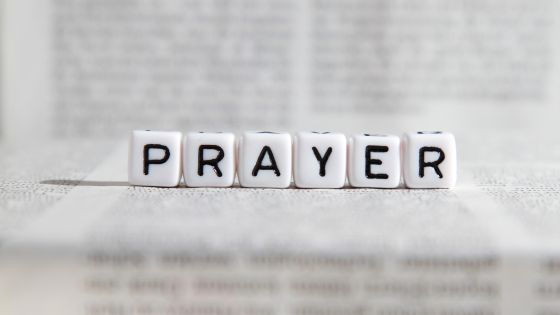Why We Should Pray, Why We Don’t Pray, and What Difference Does It Make?
If you feel as though your prayer life is lackluster or even nonexistent, you are not alone. For the past few years, I’ve been exploring ways to enrich and grow my relationship with God through prayer. These practical ways to know God more deeply through prayer are effective means to engage with our relational God in a powerful way.
Prayer is a gift to us. Imagine the Creator of all we see and know of the universe wanting us to talk to Him! Like salvation, He doesn’t force it on us. He tells us that if we seek Him, we can know Him.
Searching For God Means We Should Talk To Him
“But from there you will seek the Lord your God, and you will find Him if you search for Him with all your heart and all your soul.”
Deuteronomy 4:29 (NASB)
You can feel the longing expressed in that verse. Searching and seeking can and should involve reading our Bibles and spending time with other Christians who can encourage us, but it seems only logical that to have a deep and meaningful relationship with God, we need to talk to Him.
“…the worst-kept secret in church history is that most people, even most Christians, don’t really like prayer. Don’t get me wrong, we still do it, mainly out of guilt or obligation or because we know it’s good for us, making prayer the spiritual equivalent of celery.”
-Tyler Staton
As you read through these ways to make prayer a habit and a joy, you’ll periodically find written prayers or suggestions to focus your thoughts, such as the prayer below.
PRAYER
Gracious heavenly Father, thank you for your faithfulness to me. I ask right now that You would give me the desire to search for You and seek You with all my heart. As we read in Psalm 25, “Show us Your ways, Lord, teach us Your paths. Guide us in Your truth and teach us, for you are God our Savior, and our hope is in you all day long.” Thank you for the blessing of knowing You as my Creator, Savior, Father, and Friend.


(Disclosure: As an Amazon Associate I earn from qualifying purchases. This means that if you click a link and make a purchase, I may receive a small commission at no additional cost to you. I only recommend products I use and love or would love to use! For full disclosure details, click here.)
Why We Should Pray
Scripture Tells Us To
We should pray because scripture commands us to. Not only do we see the example of people praying in both the Old and New Testaments, but the Bible clearly tells us to pray. Probably the most well known instance of this is when Jesus uses the Lord’s Prayer as an example of how to pray. Here is a short list of ways scripture instructs us to pray.
- pray without ceasing (1 Thessalonians 5:17)
- pour out our hearts to God (Psalm 62:8)
- draw near to God (Hebrews 4:16, James 4:8)
- make requests (Philippians 4:6, 1 John 5:14-15)
- ask for wisdom (James 1:5)
- pray for each other (James 5:16)
- pray for those who mistreat us (Luke 6:28)
- devote ourselves to prayer (Romans 12:12)
- follow the example of the Lord’s prayer (Matthew 6:9-13)
- address God as Father
- remember His sovereign authority
- treat His name with honor
- pray for God’s kingdom to be displayed on earth
- ask for physical needs to be met
- ask forgiveness
- plead to be spared from temptation that would cause us to sin
- ask to be delivered from evil

Prayer Provides Perspective
Prayer is an acknowledgment of our need for God. It puts us in the position of recognizing who we are and who God is. It provides us with the opportunity to offer praise and worship. Knowing exactly what God wants us to do is not the aim of our life; worship is. We may pray for guidance on a lot of different issues and never really feel sure of exactly what God wants, and that’s ok. What He wants is for us to act in accordance to what we know of His will and to give Him the glory.
Prayer Develops Relationship
Our God is relational and it’s hard to have a relationship with someone you never talk to.
We instinctively know the difference between knowing a lot about a person and having a relationship with a person. Someone we look up to as a hero may inspire deep admiration, but without the relationship, there’s no intimacy or closeness that comes from shared experience. That kind of relationship is what God wants for us.
If your husband only talked to you the way you talk to God, how would you feel about your relationship?
If he engaged with you once in a while, only when he wanted something, or when he already has a plan mapped out and just needs you to get on board?
Think about how often you pray. Do you spend any extended time in prayer or do you quickly offer up a “thank you for this food” and a rushed prayer for protection as you leave the driveway?
While God is not a human being, it’s clear that he interacts with us as a “person” with emotion and will and deeply desires a loving relationship with us. Our prayer life is a reflection of our relationship with God.
Prayer Is a Lifeline
What do we do when the knowledge we have of God doesn’t line up with what we are experiencing?
As one person put it, “my theology didn’t line up with my reality.”
We know in our head that God is good. We believe that because we’ve read it in scripture and probably seen evidence of it in our own lives and the lives of others.
But what about when what He’s doing doesn’t appear good?
This conflict is actually what drew me to a desire to experience prayer in a deeper way. I wrestle regularly with the belief that God is actually good. So much of what I see and hear and know about my life, my family’s life, friends’ lives, in my community, my state, my country, and the world, is NOT GOOD. God is powerful; He can change things. Why doesn’t He do this thing, or change that heart?
I don’t think we can process these doubts, questions, and emotions very well without prayer. Prayer allows us to cling to faith and plead with God to not let us turn away, to renew our faith, and help our unbelief.
Prayer Begets Prayer
“The more we pray, the more we shall want to pray. The more we pray, the more we can pray. The more we pray, the more we shall pray. He who prays little will pray less, but he who prays much will pray more. And he who prays more, will desire to pray more abundantly.”
– Charles Spurgeon
The best way to grow in prayer is to start praying.
We talk about praying for someone a lot, but when do we actually do it? We can’t think ourselves into a practice of things, we need to actually practice them.
I’ve seen evidence of this in my own life. I would tell someone I’d pray for them, but without a habit of prayer, many times I would pray once or twice and then forget about it until I saw that person again and felt guilty about not actually following through with praying for them like I promised. Justin Whitmel Earley speaks of habits as levers of grace. He says, “they may be small, but Jesus uses small things that we do to honor His commands in big ways and they start to grow.”
“Cultivate prayer as a habit and regular discipline whether we feel like it or not.”
-Martin Luther
PRAYER
Lord, I’m asking You to give me a deep desire to spend time with You. Until I develop that desire and longing to spend time with You, help me to obey Your word and pray to as an act of obedience. Show me what I need to eliminate or reduce in my life to make that happen.
Why We Don’t Pray
So why is prayer so hard? I heard a sermon in which the speaker said “the gospel is simple, but people are complicated.” Prayer feels kind of like that. It’s simple—we know how to have a conversation, but since we’re people, we also make it complicated.
In looking into definitions of prayer, I read the Westminster Shorter Catechism definition.
Q: What is prayer?
A: Prayer is an offering up of our desires unto God, for things agreeable to his will, in the name of Christ, with confession of our sins, and thankful acknowledgment of his mercies.
This is a beautiful definition, and true, and helpful, but if you’re a follower of Jesus, God hears our prayers even if they don’t follow this exact pattern. God hears our whispered “help me, Lord” prayers and scripture tells us He even hears us when we don’t have words at all, the Spirit intercedes for us. (Romans 8:26)
Sometimes we think we need an overwhelming experience to feel close to the Lord. That is not true.
What we do need is time with the Lord. Intimate relationships require time.
Too Busy
“Most days, we don’t pray simply because we don’t get around to it.”
-Ronald Rohlheiser
Most of us automatically respond to a question of “how are you” with a harried “so busy!” We cram our lives full of work, play, obligations, and activities until our minds are muddled and our calendars overflow.
“Be still and know that I am God.”
Psalm 46:10
If we’re not willing to be still and recognize that God is in control, we miss out on the opportunity to know God and to see His hand working powerfully.
Too Distracted
“I want to pray, but I also don’t want to miss out on anything—television, movies, socializing with friends, drinking in the world.”
– Henri Nouwen
Nouwen died in 1996. Think of the increased level of distraction facing us today almost 30 years later. We are bombarded by constant, pervasive, persistent, relentless distractions.
We must actively work to combat these distractions with intention, or we will struggle to hear the still, small voice of God.
Too Self-Sufficient
“We breathe in an atmosphere of doubt. Prosperity causes us to rely on talent, resources, and retirement plans.”
Philip Yancey
In middle class America, we generally have everything we need, and much of what we want. In times of desperation we call out to God for healing or help when crisis strikes, but for the most part we ignore God. Effectively, we tell him, “No need to bother you with my day-to-day. I know you’ve got important stuff to handle. I got this.” We treat God like our last-ditch safety net or insurance policy that we don’t really expect to need if all goes as planned.
We Lose Our Longing to Know God
In her book entitled, Fervent, Priscilla Shirer writes about strategies the enemy of our soul uses to discourage us from praying. Our hearts are full of longing, but it is so frequently misdirected. We long to look good, feel good, and have good. As you read this list, think about these things as ways we lose our longing to know God, and consider which ways you find most true in your life.
- Passion: Dulls my interest in spiritual things
- Focus: Distracts and manipulates my perspective
- Identity: Magnifies my insecurities and makes me doubt the power of God
- Family: Disintegrates and divides my family
- Past: Reminds me of past mistakes and poor choices, keeps me burdened by guilt
- Fears: Magnifies my fears, uses anxiety and intimidation to keep me from praying
- Purity: Tempts me toward certain sins, learns the conditions that make me most likely to indulge them
- Pressures: Makes everything seem urgent, keeps me busy and overwhelmed
- Hurts: Ensures my heart is angry, bitter, and unforgiving
- Relationships: Creates division between Christians
PRAYER
Take a few minutes to confess the ways you personally are discouraged from praying and ask the Lord to work in those areas. Ask Him to give you a hunger to KNOW HIM more than anything else.
What Difference Does It Make?
There are two ways of thinking about prayer that only cause us to become discouraged.
First, believing that if we pray hard enough, God will do what we ask.
Second, believing there’s no point in praying, since God will do what He wants to do anyway.
Neither of these beliefs is true. While God wants us to pray, He is not a puppet to be controlled by our prayers. Prayer is a gracious gift that allows us to participate in what God is doing in the world.
“When we ask the present to give us what only eternity can give, we end up driven, frustrated, discouraged, and ultimately hopeless.”
-Paul David Tripp
Scripture says that David was “a man after God’s own heart.” We know that David was deeply flawed, and if we’re honest, we might even consider ourselves superior to a man who committed adultery (if not rape) and murder. Recently I was pondering what made David a man after God’s own heart, and I think it’s related to this intimate relationship created by laying open our hearts and minds before God. Surrendering our deepest thoughts to God allows Him to change our hearts and direct them toward worshipping Him.
Consistent Prayer Changes Us
That heart change is the big difference that prayer makes. God doesn’t need our prayers. We need to pray. Consistent, worshipful prayer changes our hearts.
- Redirects our focus (upward and outward vs. inward)
- Redefines our perspective (temporal vs. eternal)
- Keeps short accounts (confession and repentance)
- Provides opportunity to minister to the lost (can I pray for you is almost always welcome)
- Makes us more like Christ (analogy of how we become more like the people we hang around the most)
- Helps us remember that God is bigger than our prayers. During times we don’t “feel” God’s presence and don’t understand the “whys”, we can cling to the knowledge that he is still there and still good.
How Can We Know God Through Prayer
Study the Scriptures Prayerfully
“We should listen, study, think, reflect, and ponder the scriptures until there is an answering response in our hearts and minds. It may be one of joy or of confusion or of appeal—but that response to God’s speech is then truly prayer and should be given to God.”
-Tim Keller
We need to live in constant watchfulness for what God wants to reveal to us. We can learn more of God through appreciation of His creation, through seeing His character in the lives of others, but we have the divinely inspired word of God and there is more for us to learn of God in scripture than we can possibly learn in a lifetime.
Personally, reading scripture slowly, praying and meditating on scripture has changed both my appreciation for scripture and my prayer life.
I spent many years checking off my Bible reading to get through the passage set up in my Bible read-thru for the day, without spending really any time talking to God about what I was reading.
Learning more of God’s character as revealed to us in the Bible gives teeth to our faith. It allows us to dig in and hold on when what we feel about God doesn’t match up with what scripture says.
Acknowledge our Position
Recognize God as the Creator, Sustainer, Lord, and King…who wants us to talk to Him.
“Too many of us pray carelessly. We have “habitual” prayers that we murmur before bed or at meals. We shuffle up to the throne of God, yawning and muttering the first thing that comes to our mind. We casually utter our praises, our petitions, our thanksgivings, our supplications—hardly stopping to think before we open our mouths. There’s danger in doing that. We should feel wonder and reverent fear.”
– Joni Eareckson Tada
Don’t Treat God Like a Vending Machine
This would be the type of prayer we think of as vending-machine prayer; punching in our requests. We know how this feels in the context of human relationships. We would call someone who interacted with us this way selfish, interested only in what we can provide for them.
“Let us then approach the throne of grace with confidence, so that we may receive mercy and find grace to help us in our time of need.”
(Hebrews 4:16)
I’ve heard this verse many times and usually focus on the first and last parts of the verse. I can approach the throne of grace with confidence—thank you, Lord. And he’ll help me in my time of need—what a blessing. But that middle phrase stood out to me recently.
So that we may receive mercy. We must acknowledge our need of mercy and our position in relation to the God of the universe.
Remember To Be Grateful
I heard someone talk about the great number of times they say “no” to their kids over the course of a day or week, and how their kids whine and complain about that, but don’t think to acknowledge the many things mom is doing to provide and make life possible for those kids.
We can see ourselves as the kids in that scenario, right? ‘Why am I not getting what I want God?’ instead of ‘thank you for the breath in my lungs today, God.’
That’s not to say that God doesn’t want us to bring Him the everyday, ordinary requests we have. He does indeed want that.
But we need to remember who we’re talking to and sometimes need to check our posture. It should be one of submission and reverence. The God of the universe WANTS to hear from me. How astounding is that? He wants to spend time with me and wants me to WANT to spend time with him, not just do it out of obligation.
PRAYER
Almighty God, creator and sustainer of all things, I come before You in awe and reverence. I’m so thankful that You are the powerful and just ruler of everything visible and invisible. I ask that You would develop in me a greater understanding of Your glory and power when I come to You. Thank You for the privilege I have to approach Your throne of mercy and grace with confidence, bringing my needs and requests to You because of the sacrifice of Your son in payment of the punishment I deserved. I’m forever grateful and offer my praise and worship to You.
Repeatedly Relinquish Control
“We mostly spend our lives conjugating three verbs: to want, to have, and to do. Craving, clutching and fussing, we are kept in perpetual unrest” (Evelyn Underhill).
-Evelyn Underhill
My prayers are full of what I want, what I think I should have, and what I want God to do.
In her book, Seeking God, Joni Eareckson Tada wrote of receiving a letter that stated…
“Many believers gaze at their problems and glance at the Lord. But I tell you to gaze at the Lord and glance at your problems.”
Joni’s response: “Too many of us fix our eyes on our problems, the hurdles, and we start measuring the height of the next jump. In so doing, we glance occasionally at the Lord only to make sure He’s aware of all the hardships these hurdles are causing us.”
The question we need to ask is if Jesus loved us enough to die for us, can’t he be trusted to love us enough to answer our prayers in the best possible way for us?
There’s a song played on the radio frequently talking about praying in Jesus’ name. I think some of us operate under the misconception that ending our prayers “in Jesus name” is a magic phrase that commands our prayer to be answered. It should instead be a reminder to align our prayers with who Jesus is and His will. He is God and we are not.
PRAYER
Ask for humble and joyful submission to God’s will, timing, and rule in your life.
Don’t Do All the Talking
Have you ever known someone who hardly lets you get a word in edgewise? When we rattle off our prayer requests to God and then sign off and move on with our lives until the next time we list out our hopes and dreams for Him again, we reveal how little we actually desire to know Him.
Knowing God through prayer requires us to listen as well as talk.
- Start a conversation when reading His word and look for His responses (praying scripture is a great way to start)
- Listen for the Holy Spirit’s promptings (the still, small voice) and check what we think we’ve heard against scripture
“We show how little love we have for God by preferring to listen to His servants rather than to Him. We like to listen to personal testimonies, but we don’t want God Himself to speak to us. Why are we so terrified for God to speak to us? Perhaps it’s because we know that when God speaks we know we have only two choices: Either we will do what He asks, or tell Him we will not obey. But if it is simply one of God’s servants speaking to us, we feel obedience is optional, not imperative.”
-Oswald Chambers
Listening for God’s voice should always be done in conjunction with input from the Bible, His inspired word to us. But we should make space and time to pay attention to what He wants to say to us. If we go too long without listening, He may choose to grab our attention in ways we would not choose.
Bring Yourself to God
God doesn’t expect us to be super serious and put on a “spiritual” face to meet with him.
I listened to a woman tell a tragic story about losing her husband, and after experiencing a comedic situation at his memorial service, recognizing the gift of laughter God had brought into that difficult circumstance.
Our God is a God of joy and humor and it’s clear from the way He created my husband and at least one of my kids, that being serious like me is not the only way to be.
Bring God your words, your personality, and your unique way of communicating. You don’t have to pray the same way as someone else.
God Wants to Hear Your Unique Voice
Years ago, I read an illustration describing how we are each created uniquely by God. If you haven’t heard of the Clifton Strengths Finder, it’s a type of personality test that lists 34 different strengths. The illustration was written by Kat Lee in her book, Hello Mornings, which I highly recommend!
Here’s my simple paraphrase of her illustration:
[The odds of anyone having the same top 5 strengths in the same order as you is 1 in 33.4 million. The odds of anyone having all 34 strengths in the same order as you is 1 in 3×1038. A trillion only has 12 zeros. So in all of human history—past, present, and future—there has never been and never will be anyone exactly like you.]
God made you to love, serve, and glorify Him in ways that are unique from every other person who has ever lived or will ever live. He wants you to bring everything you are to Him and let Him sort out the tangled messes we make of things when we try to direct and control things on our own. Don’t wait until you feel like you’ve got the right words or your life is cleaned up a little. He knows it all and He just wants you to lay it out and surrender.
How Can We Not Want to Know This God?
I heard someone describe the compelling stories of Christian faith as not so much about interesting people, but more about an interesting God and the ways he works in the lives of ordinary people.
This God loves us more than we can imagine. He engages our minds, our emotions, and our creativity. We don’t have to wait for eternity to begin knowing Him. We can start right now. He makes Himself knowable to us and invites us to bring our joys, sorrows, desires, and questions to Him. How can we not want to know this God?

Practical Ways to Deepen Your Prayer Life
Pick one or two ideas below that you would find helpful and implement them this week. It can be useful to be systematic with our prayers when we don’t know where to start or find it difficult to be consistent. Don’t underestimate the power of starting small.
1) Choose a time of day you want to commit to regularly pray
- Morning (before you even get out of bed or reach for your phone)
- At the breakfast table
- In your car
- On a walk at lunchtime
- In the shower
Make it easy to follow through on your intentions by setting a reminder or posting a note on your mirror or refrigerator door.
2) Choose an everyday cue and connect it to prayer
Every time I ___________ I will pray about/thank God for ___________.
EXAMPLES
| Get dressed Wash dishes Brush my teeth Vacuum Wait in line at the grocery store Water plants | What God wants to teach me today My family My church leaders A missionary family A person ahead of me in line A deep love for the word of God |
3) Confess wrong attitudes
- Have I been too casual in the way I approach the King of Kings and Lord of Lords?
- Has my prayer life become dry and carelessly habitual?
- Do I rattle through my list of prayer requests to get it out of the way as quickly as possible?
- Do I talk to God only when I’m desperate?
- Do I spend any of my time praising God for His attributes?
- Do I approach God with confidence and believe that He hears?
- Do I bring the little things to God and believe that He cares about my daily concerns?
- Do I frequently come up with a plan and then ask God to give me the strength and ability to accomplish what I’ve decided I want to do?
- Are my prayers mostly requests for things I want, think I should have, or want God to do?
If necessary, set aside a time this week to confess the ways you’ve been selfish or careless toward the privilege we have to communicate directly to our Creator and Savior. Ask God to reveal to you how you can take steps to enjoy a robust and intimate prayer life.
4) Ask God questions when you pray
Then, listen for His answers—through Scripture, fellow believers, or circumstances in your life.
- What do you want to teach me about Your character?
- What are you telling me about how my character needs to change?
- How do you want me to be involved in advancing Your kingdom?
5) Look back at the reasons we don’t pray and identify those that apply to you
Find scripture to help you combat those reasons and write them out. Keep them in a place you will see them daily, review them every morning or when you sit down to read your Bible.
6) Make a list of some attributes of God and praise Him for these regularly
- Faithfulness (Hebrews 10:23)
- Forgiveness (1 John 1:9)
- Patience (2 Peter 3:9)
- Love that never fails (Psalm 36:5)
- Power (Psalm 24:8)
- Mercy (Psalm 100:5)
- Generosity (James 1:5)
- Unchanging nature (Matthew 24:35)
- Goodness (Psalm 34:8)
- Wisdom (Romans 11:33)
As you praise Him for those attributes, if appropriate, ask him to increase those qualities in you.
7) Find a prayer partner
Commit to praying for one another daily or weekly and checking in regularly.
8) Pray scripture
Praying the Psalms is a great place to start.
Read: 30 Days of Praying Scripture


9) Keep a prayer journal
Write down your requests, responses, praises, and even write out complete prayers.
10) Turn distracting thoughts into prayers
As you pray and find your thoughts beginning to wander, pay attention to what you’re distracted by or thinking about and bring that to the Lord in prayer right then. Praying out loud can help with focus as well.
11) Read and listen to stories that encourage your faith
Read and listen to stories that contribute to your knowledge of who God is and what He is doing in the lives of other everyday people. Fill your mind with testimonies of God’s goodness and power as a way to increase your own faith.
12) Use written prayers to help you get started
Sometimes we don’t have the words on our own, and it’s helpful to use a prayer written by someone else as a starting point for expressing our thoughts to God. Below are a couple of prayers I love to use this way.
John Baillie:
O God, give me grace today to recognize the stirrings of Thy Spirit within my soul and to listen most attentively to all that Thou hast to say to me. Let not the noises of the world ever so confuse me that I cannot hear Thee speak.
Elisabeth Elliot:
Loving Lord and heavenly Father, I offer up today all that I am, all that I have, all that I do, and all that I suffer, to be Yours today and Yours forever. Give me grace, Lord, to do all that I know of Your holy will. Purify my heart, sanctify my thinking, correct my desires. Teach me, in all of today’s work and trouble and joy, to respond with honest praise, simple trust, and instant obedience, that my life may be in truth a living sacrifice, by the power of Your Holy Spirit and in the name of Your Son Jesus Christ, my Master and my all. Amen.
This poem that I wrote in 2021 seems appropriate to share given the topic of prayer and listening to God.
Stillness
by Andrea Otto
In the stillness of the morning
I can hear my Savior say,
I am with you, with you always,
Come what may, come what may.
In the darkness of the evening
I can hear my Savior say,
Were you with Me, with Me ever,
In the doing of the day?
Visit my homeschool resources page for monthly unit study ideas, projects, and homeschool planning help!








